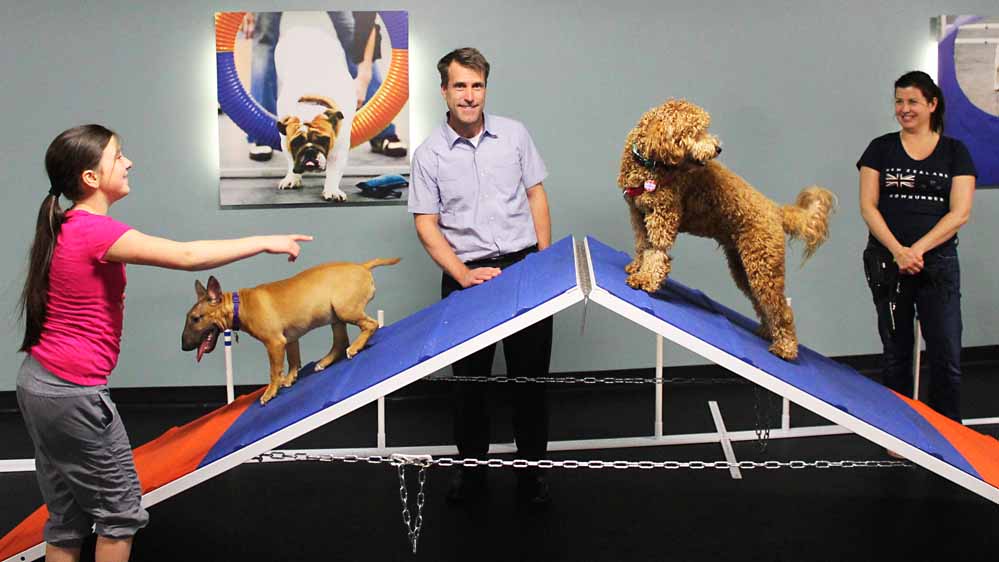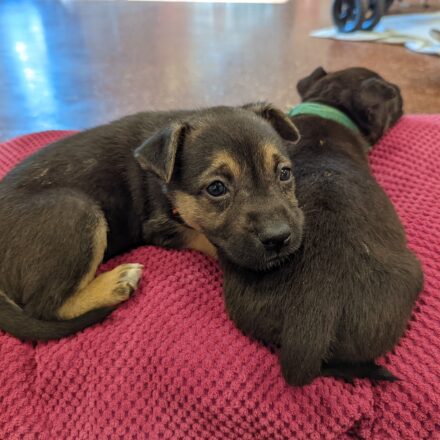Why Local Experts in Dog Training Near Me Outperform DIY Methods
Wiki Article
Essential Tips and Techniques for Learning Pet Training at Home
Grasping pet dog training at home calls for a calculated method. Uniformity, patience, and positivity are crucial elements. Establishing a routine helps develop a complacency for the pet dog. Utilizing favorable reinforcement constructs count on and communication. Nevertheless, numerous proprietors have a hard time with maintaining rate of interest and interaction throughout training sessions. Comprehending how to browse these obstacles can result in extra efficient training results. What approaches might be most advantageous in getting over these common challenges?Establish a Regular Routine
When educating a dog, developing a consistent routine is crucial for cultivating etiquette and a strong bond in between the proprietor and pet dog. A structured timetable offers pet dogs with a complacency, aiding them understand what to anticipate every day. Normal feeding times, exercise, and training sessions produce a predictable setting, which can minimize anxiety and promote a sense of security.Owners should aim to integrate day-to-day tasks at the exact same time to enhance this regimen. Morning walks, playtime, and training workouts need to take place regularly. In addition, incorporating commands and cues throughout these tasks can additionally boost learning.
Usage Positive Support
A constant routine prepares for reliable training, however the approaches made use of during training sessions significantly influence a pet dog's learning experience. Positive reinforcement becomes a powerful tool fit preferred actions. This method entails compensating a pet dog for exhibiting specific activities, efficiently motivating them to repeat those actions (Dog Training Near Me). Rewards can include deals with, appreciation, or playtime, producing a positive organization with the activity executedUtilizing favorable reinforcement fosters a bond of count on between the pet and trainer, enhancing interaction and understanding. It is important to supply rewards immediately after the desired actions to strengthen the link. Uniformity in applying this technique ensures the pet can plainly connect the behavior with the reward. Furthermore, avoiding penalty or negative reinforcement can lead to a much more enthusiastic and positive student. By concentrating on favorable support, instructors can produce a helpful environment where dogs thrive and learn effectively.
Maintain Training Sessions Short and Enjoyable
Efficient canine training calls for maintaining sessions appealing and brief to keep the canine's attention and interest. Usually, sessions ought to last no longer than 10 to 15 mins, as pets have actually restricted focus periods. By focusing on short periods, fitness instructors can prevent aggravation for both the pet and the trainer, enhancing the learning experience.Integrating play and favorable communications into training can make sessions delightful. Using playthings, deals with, or praise as benefits not only motivates the canine however likewise enhances the bond in between the family pet and instructor. Changing tasks frequently can additionally help maintain the pet dog's rate of interest to life, as different jobs boost mental engagement.
Moreover, ending each session on a favorable note, such as celebrating a little victory, guarantees the pet links training with enjoyable. Ultimately, keeping training sessions pleasurable and brief promotes reliable learning and strengthens the general training process.
Establish Realistic Goals
Setting reasonable objectives is crucial for effective canine training. Fitness instructors should start by reviewing their dog's current abilities and behavioral tendencies, permitting them to establish attainable objectives. Rather than aiming for complicated commands, beginning with standard hints like "sit" or "remain" can cultivate a sense of accomplishment.Furthermore, damaging down bigger objectives into smaller sized, workable steps helps maintain motivation for both the instructor and the pet dog. This strategy additionally permits changes along the way, making certain that challenges do not become overwhelming.
In addition, it is essential to recognize that each canine discovers at its very own pace; persistence is essential. Keeping assumptions based aids avoid aggravation and encourages constant progression. Dog Training Near Me. go right here To wrap up, establishing realistic objectives not only boosts the training experience but additionally reinforces the bond between the dog and the instructor, causing an extra unified and efficient training journey
Socialize Your Dog
Accomplishing reasonable training objectives prepares for an all-around canine, however socializing plays a significant role in a dog's growth. Mingling a canine entails revealing it to numerous environments, individuals, and various other pets, which helps to build self-confidence and decrease stress and anxiety. Early socializing, ideally in between three and fourteen weeks of age, is essential for forming a pet's behavior and character. This exposure enables pet dogs to find out ideal communications and establish vital social skills.Owners should present their pet dogs to different scenarios progressively, making sure each experience is gratifying and favorable. Checking out parks, attending young puppy classes, or preparing playdates with other pets can facilitate these communications. In addition, observing various other dogs and discovering from their actions can even more improve a pet's dig this social skills. Eventually, positive and regular socialization promotes a well-adjusted canine that easily navigates various social setups throughout its life.
Hold Your Horses and Persistent

Persistence is crucial. Normal practice strengthens commands and habits, guaranteeing that the pet dog preserves what has been learned. It's essential to celebrate little success, as they urge both the pet dog and the owner to keep progressing. Acknowledging troubles as component of the trip instead than failures can find out this here assist preserve motivation. Eventually, a person and relentless strategy not just builds a stronger bond in between pet and proprietor however also lays the foundation for efficient training and long-term obedience.

Integrate Educating Into Daily Life
Integrating training right into every day life can enhance a pet's discovering experience. Routine tasks, such as feeding or strolling, present useful chances for positive reinforcement. By effortlessly mixing training with everyday actions, owners can grow better habits in their animals gradually.Daily Regimen Assimilation
How can canine owners flawlessly blend training into their day-to-day regimens? By incorporating training sessions into everyday activities, owners can boost their dog's discovering experience. Simple commands can be practiced throughout walks, such as "sit" before going across streets or "heel" while steering through parks. Feeding time presents another possibility; owners can integrate commands like "wait" or "leave it" before providing the food dish. Additionally, playtime can work as a training ground for commands like "bring" or "drop it." Uniformity is essential; by embedding training right into regular activities, canines discover that commands are appropriate in different contexts. This technique not just strengthens discovering however additionally enhances the bond between the dog and its proprietor.Positive Support Opportunities
Training chances are plentiful throughout a pet's daily life, particularly when combined with favorable support methods. Daily activities provide minutes for training, such as throughout walks, feeding times, or play sessions. For instance, awarding a dog for sitting before getting food improves obedience while promoting a positive association with commands. Similarly, commending a pet for calmly greeting guests reinforces preferable actions. Integrating training into play, like making use of fetch to practice commands, can also work. Proprietors must remain constant, making use of deals with, praise, or playthings as benefits to urge good behavior. By integrating training perfectly into day-to-day routines, proprietors can cultivate a mannerly canine while enhancing their bond, making the training process delightful for both celebrations.Frequently Asked Inquiries
What Age Is Best to Beginning Educating My Dog?
Establishing the very best age to start training a pet varies; however, professionals often recommend starting around 8 weeks. Early training fosters socializing, establishes regimens, and aids form positive actions, promoting a well-adjusted, loyal buddy.Exactly How Can I Quit My Pet Dog From Barking Excessively?
To minimize extreme barking, one efficient method entails recognizing triggers, providing constant training commands, and fulfilling silent habits. Furthermore, normal workout and psychological excitement can help minimize unneeded barking by addressing boredom or stress and anxiety.What Should I Do if My Dog Ends Up Being Aggressive?
When a dog presents aggression, it is necessary to stay calm and prevent conflict. Identifying triggers, looking for expert assistance, and utilizing favorable reinforcement methods can properly manage and decrease hostile behavior in canines.Exactly how Do I Choose the Right Training Tools?
Picking the best training tools entails reviewing the canine's size, training, and character objectives. Research study various choices, speak with professionals, and focus on humane, effective tools that advertise favorable support for an effective training experience.
Can I Train My Dog Without Expert Assistance?
Educating a canine without professional aid is practical for several proprietors. With devotion, patience, and regular technique, individuals can successfully show fundamental commands and enhance positive habits, fostering a strong bond in between them and their pet dog.A regular regular lays the foundation for reliable training, yet the methods utilized during training sessions greatly influence a dog's learning experience. Efficient dog training needs maintaining sessions brief and interesting to keep the pet dog's focus and enthusiasm. Accomplishing sensible training goals lays the groundwork for a well-shaped pet dog, yet socialization plays a considerable function in a canine's advancement. Furthermore, finding out and observing various other canines from their behaviors can further boost a pet dog's social skills. Picking the appropriate training tools involves assessing the pet's dimension, training, and character objectives.
Report this wiki page